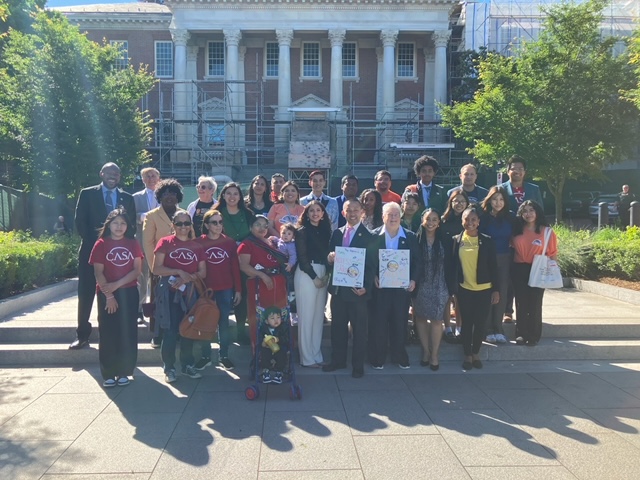May 10, 2018
Op-Ed by Vincent DeMarco, Stan Dorn
The Affordable Care Act has brought health care coverage to more than 400,000 uninsured Marylanders, but this progress has been threatened as health insurance premiums in the individual market have skyrocketed under the Trump administration. Thankfully, Maryland is one of the states leading the nation in stabilizing premiums in its individual market. We commend the Maryland General Assembly and the Hogan administration for passing legislation that creates a reinsurance program to slow premium growth and that protects Marylanders from the Trump administration’s proposed rule that would further undercut insurance markets by expanding the sale of short-term plans with inadequate coverage and consumer protections.
However, even with this progress, premiums are expected to rise at twice the rate of inflation in 2019 due in significant part to ongoing federal efforts to sabotage the Affordable Care Act, including the choice to stop enforcing the Affordable Care Act’s individual mandate. As candidly admitted by Tom Price, former Trump administration Health and Human Services secretary, this will lead many young and healthy adults to drop coverage, worsening the risk pool and increasing premiums.
That is why in 2019 the newly elected governor and General Assembly need to enact the innovative Health Insurance Down Payment plan, which was introduced in the 2018 session by Sen. Brian Feldman and Del. Joseline Peña-Melnyk.
Here’s how it would work: At tax time, Marylanders would be asked if they had comprehensive health coverage for the past year. If the answer is “no,” and they had affordable access to coverage, they would need to make a tax payment, as under federal law today. However, the Maryland plan improves on the federal law by turning the federal tax penalty into a down payment for health insurance. Consumers could use these payments to buy quality, affordable health care, rather than simply write a check to the state or federal Treasury.
More than 100,000 consumers who were uninsured in 2016 could have bought insurance for no more than the cost of their federal tax credits plus payments they owed for being uninsured. Two-thirds of them were under age 45, and nearly 40 percent were under age 35. Under the down payment plan, these uninsured consumers who do not pick a health plan and have one available essentially for free would be automatically enrolled into insurance, so long as they request coverage on their state income tax return.
By leading numerous young and healthy adults to join the individual market, this innovative solution would cut premium increases substantially. Even if Maryland’s approach were no more effective than the previous federal enforcement regimen, cost growth in the individual market would fall by 50 percent. For the first time in living memory, health insurance cost increases could fall in line with other household expenses for more than 200,000 Maryland residents who buy their own insurance without financial help from an employer or the government.
The Health Insurance Down Payment Plan would help consumers, like small business-owner Tim Reyburn, who purchases individual health coverage through the Maryland Health Benefit Exchange and does not receive federal subsidies. Because of dramatically increasing premiums, Mr. Reyburn had to drop his preferred plan and move to far more limited coverage. The Down Payment plan could help Mr. Reyburn keep his insurance in the future, rather than downgrade coverage in response to rising prices.
Marylanders support the Health Insurance Down Payment Plan. In contrast with the federal individual mandate, Maryland voters favor this plan across party lines, with Republicans, Democrats and independents alike favoring the plan by more than a 2 to 1 margin.
Bipartisan thought leaders point to the down payment plan as a model for nationwide replication. Health Affairs Blog recently posted an analysis by experts at Families USA, a consumer advocacy group, and two conservative research organizations, the American Enterprise Institute and Stanford University’s Hoover Institution, that characterized Maryland’s down payment plan as an example of how other states and the federal government can use automatic enrollment to cover the uninsured, stabilize insurance markets and slow premium growth.
The Health Insurance Down Payment Proposal received widespread support in this year’s General Assembly but ultimately was not part of the package agreed to by the legislative and executive leadership. The next governor of Maryland should make this plan a top priority during the next legislative session.
We encourage gubernatorial candidates from the major parties to sign a “Candidate Statement of Support” for the Health Insurance Down Payment Plan by Friday, May 18th. On May 23, Maryland Citizens’ Health Initiative will publicly announce the gubernatorial candidates who have endorsed the Candidate Statement of Support.
Vincent DeMarco (demarco@mdinitiative.org) is president of the Maryland Citizens’ Health Initiative. Stan Dorn (sdorn@familiesusa.org) is a senior fellow at Families USA, a national, nonprofit, nonpartisan organization dedicated to the achievement of high-quality, affordable health care for all Americans.



